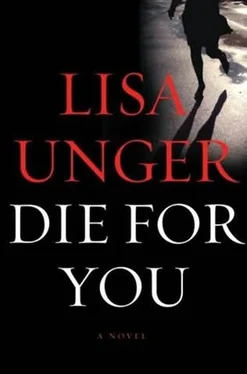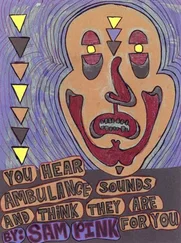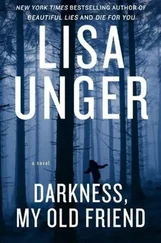Fred was standing in the doorway when I reached the front step of the house. He wore an expression of concern as he watched the taxi depart. In his gray cardigan sweater and pressed navy slacks, he was solid, comforting, stronger than his seventy-five years.
“Isabel Blue,” he said.
He’d called me this since we first became friends, a few years after he married my mother. The timing of this coincided with my sister leaving for college. When she moved into the city to go to Columbia University, she took a lot of her anger with her. I’d always adored and worshipped my older sister and I grieved her departure from the house, but even I had to admit that the dynamics in our home shifted for the better without her.
Like sand over ice, her absence allowed us to find firmer footing with each other. We were able to welcome my father’s memory home-hanging old photographs, my mother and I talking openly, fondly, about him and the good things we remembered. Linda had hated for anyone to mention him, had sunk into despair on his birthday, Father’s Day. For Linda, sadness had always been best expressed through anger. And her outbursts were frequent and passionate. With therapy and Erik, that had changed in her adult life. But out of loyalty to her-and not a little fear of her temper-I had kept my distance from Fred for the early years of his marriage to our mother.
Fred always weathered the storms of Linda’s unhappiness with patient stoicism, as though he believed on some level that he deserved her anger. Maybe he did. I don’t know. With the fog of her unhappiness dissipated, Fred and I saw each other for the first time over the kitchen table. I was dressed for school, feeling sad, missing my sister. He said, “Isabel Blue.”
I looked at him and he offered me a warm smile. “It’s not so bad, Isabel. She’s just a train ride away.”
I didn’t have words for it then, the sad hollow inside me, the recognition that everything changes, that people die or they just leave you, and that you’re expected to move along in the current of your life as though nothing has happened. It seemed terribly unfair to me at thirteen years old. Why did people even bother with anything if it was all just going to fade away or be wrested from you?
“My barn having burned to the ground, I can now see the moon.” Fred was fond of haiku.
What a weirdo with his stupid sayings and those long, slow walks. How could she have married him? My sister’s nasty comments lingered in my head. But that morning I suddenly saw someone different. Now that she was gone, not always whispering something in my ear, I saw someone kind, much like my father, but someone present, mindful- not like my father. Even when my father was smiling, laughing, joking, I could sometimes see it behind his eyes-anxiety, unhappiness-flickering like a firefly in a jar.
“What does that mean?” I asked. I liked the rhythm of the words. I liked the way each word fell to the ground with its particular weight but how the meaning seemed to hover somewhere just above me.
“Think about it.”
I did. I thought about it a lot.
“YOUR MOTHER’S NOT here, dear,” Fred said, stepping aside and sweeping me into the house with a strong arm around my shoulder. I saw him looking at the bandage on my head, but he didn’t mention it, as though he thought that might be rude. “She’s off for some pampering with her girlfriends at Canyon Ranch.”
“I know,” I said, letting him take my wrap, avoiding eye contact.
He laid it over the settee in the triple-height grand foyer. The entry was bathed in a sunny wash from the skylights above. The sunlight caught on the million tiny crystals in the chandelier and cast rainbow flecks around us on the floor.
If my mother had been home, there’d be noise-a television, music, the sound of her chatting on the phone. The sound would bounce off the high ceilings, the marble floors, seem to come from everywhere and nowhere. She couldn’t stand a quiet house, or a dark one. There must always be sound and light. Today it seemed to echo with her absence with Fred’s thoughtful, quiet energy.
“What’s happened to you, Isabel?” he asked finally, turning me gently to face him with hands on my shoulders. “Who did this to you?”
“I-” I started, trying to think of a lie. But then I didn’t have the energy. “I don’t exactly know.”
“Let’s sit you down somewhere,” he said, again moving me along with that strong arm. I felt myself rest against him, the weight of it all just too much suddenly. He brought me to the large plush couch in front of the fireplace, which was lit but dwindling to embers. I sank into the soft chenille, the cushions seeming to fold around me like an embrace. I told Fred what happened to me, withholding nothing, from Marcus not coming home two nights ago through my visit to the ATM.
“I need to use the computer, figure out how much he’s taken from me. I need to try to do some research into this other missing Marcus Raine.”
Fred sat on the hassock in front of me. He’d paced and frowned during my surprisingly calm and distanced telling of events, then came to sit there and put a hand on my arm.
“What you need is rest, Isabel.” His tone was gentle but firm. “I’m going to call our lawyer and some people we know in the police department, and they’re going to handle this mess. You are going to take a bath and get into bed.”
“Fred, I can’t do that-” I started to say. But the couch was so soft and the room was so warm. He lifted my feet from the floor and placed them on the hassock where he’d sat a moment before. I sank deeper into the cushions. The room around me started to get blurry and I thought of how that ER doctor had told me I needed to rest or suffer the consequences. I wondered if this sudden fading of will and awareness was what he meant. I felt the weight of a blanket on top of me.
“Don’t worry, Isabel. We’ll figure this all out.”
“I just need to use the computer,” I said, but it didn’t sound like my voice, the words thick in my mouth.
“I’ll bring you the laptop,” he said. “We’re wireless now, after Trevor and Emily complained during their last visit.” I thought he might be humoring me but I suddenly lacked the strength to say so. The gray air darkened and swallowed me.
WHEN A HARD, loud crack, like a thick branch snapping, brought me back, I felt myself swim up through layers of deep sleep before I broke into the bright light of the room. The sound still echoed in my head, though now there was only silence. I listened to the quiet noises of the house-the ticking of the clock, the hum of heat through the vents-my whole body tense and tingling, my breathing heavy.
Like a honeycomb, all the rooms downstairs in Fred and Margie’s house connected by small hallways and pocket doors, creating a kind of circle of adjacent rooms around the foyer-the parlor led to the dining area, which flowed into the kitchen. Another exit from the kitchen led to a short, narrow passage that drifted into a massive library and study with a second-floor landing. That room reconnected to the foyer.
The sliding doors that led from the parlor to the foyer were closed, but the doors that connected it to the large dining room were open. I heard a soft click, like the sound of a lock turning.
I almost called out Fred’s name but something stopped me. Instead I slipped from the couch and let the blanket that covered me fall to the floor. I walked quietly over plush carpet toward the dining room in time to see three bulky shadows drift across the far wall. I felt a deep thump of dread in my chest, and suddenly the air around me, time itself, seemed thick and toxic with the energy of my own fear.
Читать дальше












